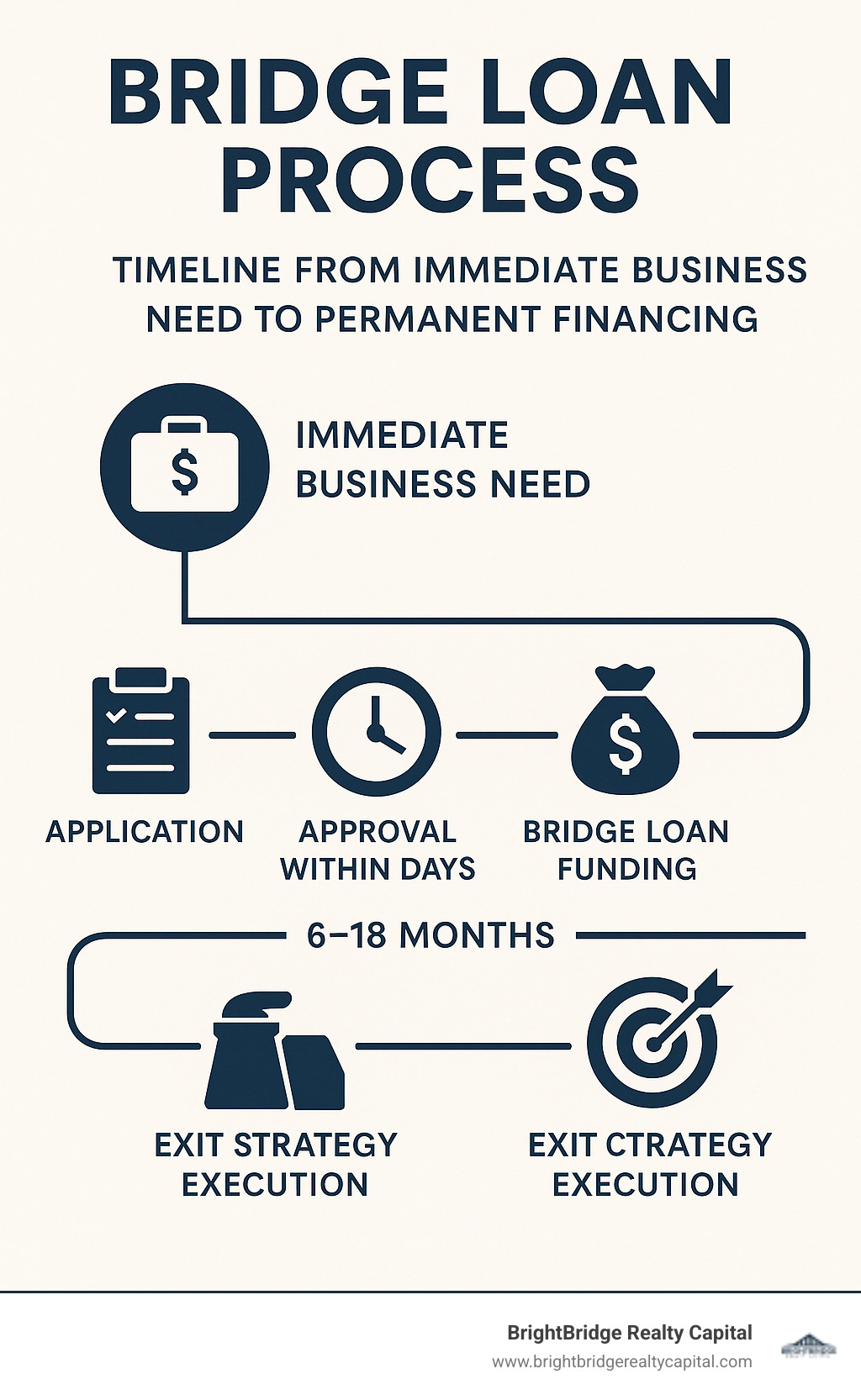Bridging the Business Gap: Essential Loans for Companies

Why Bridge Loans Are Essential for Fast-Moving Companies
Bridge loans for companies provide short-term financing to cover immediate cash flow needs while waiting for permanent funding. These loans typically range from 6-18 months and can be approved within days, making them ideal for time-sensitive business opportunities.
Quick Bridge Loan Overview:
- Purpose: Cover immediate expenses until long-term financing arrives
- Speed: Funding in as little as 24-48 hours after approval
- Terms: 6-18 months with interest-only payment options
- Rates: 8-20% depending on risk and collateral
- Collateral: Usually secured by real estate, equipment, or business assets
- Best for: Real estate deals, equipment purchases, seasonal cash flow gaps, business expansion
A business bridge loan helps you get substantial capital fast to meet urgent expenses, like closing on an investment property or funding a time-sensitive acquisition.
These loans act as a financial lifeline when timing matters most. While traditional business loans may take weeks to process, bridge financing can arrive within days, giving you a competitive edge.
However, this speed comes with higher costs. Bridge loans carry higher interest rates than conventional financing and require a clear plan for repayment through future funding or revenue.
I'm Daniel Lopez, a loan officer at BrightBridge Realty Capital. I specialize in structuring bridge loans for companies to secure funding for time-sensitive real estate deals when traditional lending is too slow.

Simple bridge loans for companies glossary:
What is a Business Bridge Loan?
Think of a bridge loan for companies as a temporary financial bridge that gets you from point A to point B quickly. It's not meant to last forever, but it's essential when you need to cross a gap.
A business bridge loan is interim financing—a short-term loan that acts as a stopgap when your company needs cash fast. Perhaps you've found the perfect commercial property but your long-term financing isn't ready, or you need to cover payroll while waiting for a client payment. That's where bridge loans shine.
These loans are typically collateral-based, secured with assets like real estate or equipment. This collateral gives lenders the confidence to approve and fund your loan quickly, often within days rather than weeks.
The fast funding is what truly sets bridge loans apart. While traditional loans can feel like they take forever, bridge loans are designed for speed. As Investopedia explains, a bridge loan is a short-term tool created to "bridge" temporary funding gaps.
How Bridge Loans Differ from Traditional Loans
Bridge loans for companies and traditional loans are built for completely different purposes.
| Factor | Bridge Loans for Companies | Traditional Business Loans |
|---|---|---|
| Speed | Fast: Funding often within days, sometimes as little as 24-48 hours after approval. | Slow: Can take weeks or even months for approval and funding (e.g., SBA loans can take up to 90 days). |
| Term Length | Short-term: Typically 6-18 months, though can range from a few weeks to up to 2 years. | Long-term: Often 5-20 years. |
| Interest Rates | Higher: Generally 8-20% due to speed, short term, and higher perceived risk. | Lower: Can be below 10%, reflecting longer terms and more extensive underwriting. |
| Approval Process | Streamlined: Focus on collateral and clear exit strategy, less on extensive financial history. | Rigorous: In-depth analysis of credit history, financial statements, business plan, and projections. |
The funding timeline is dramatically different. Traditional loans involve extensive underwriting, while bridge loans focus on two key factors: strong collateral and a solid repayment plan.
The repayment period is also much shorter, typically 6-18 months, which is ideal for time-sensitive opportunities.
How Do Bridge Loans Work?
The beauty of bridge loans for companies lies in their straightforward, speedy process.

The application process starts with basic information about your business, funding needs, and collateral. Smart borrowers come prepared with financial statements and a clear plan for how they'll use the funds.
During approval, lenders focus on the value of your collateral and your exit strategy, rather than an exhaustive analysis of your business history. They want to see that your collateral is solid and your repayment plan is realistic.
Funding is rapid, often within a week of approval. This speed gives you a competitive edge, allowing you to move forward while others are still waiting for traditional loan approvals.
Your exit strategy—your plan for repaying the loan—is crucial. Repayment is often structured with interest-only payments during the term, followed by a balloon payment of the principal.
The final repayment occurs when your exit strategy is executed, such as securing long-term financing or selling an asset. You then pay off the bridge loan and transition to your permanent financing solution.
When and Why to Use Bridge Loans for Companies
When your business faces a time-sensitive opportunity, waiting for traditional loan approval isn't an option. Bridge loans for companies are strategic tools that offer the speed and flexibility needed to seize these moments.
Think of bridge loans as your business's financial fast lane. While competitors are stuck in the slow traffic of traditional lending, you can maintain momentum and act on opportunities that would otherwise be lost.
Primary Use Cases for Bridge Loans for Companies
Bridge loans for companies are versatile and can be adapted to meet short-term needs across many industries. Here are the most common scenarios:
Real estate acquisition: Investors use bridge loans to quickly purchase properties before securing long-term financing, allowing them to make competitive, non-contingent offers. At BrightBridge Realty Capital, we help clients nationwide secure properties with our fast closing process, often within a week.
Mergers and acquisitions: Companies need immediate capital to cover transitional costs like legal fees or operational expenses while a deal is finalized.
Inventory purchases: A bridge loan lets you capitalize on bulk discounts or stock up for peak seasons without draining your working capital.
Covering payroll and operational expenses: These loans can cover critical expenses like rent, utilities, and salaries while you're waiting for a large customer payment or financing round.
Ground-up construction: Developers use bridge loans to cover initial costs like land acquisition and permits before traditional construction loans are available. Our specialized ground-up construction loans at BrightBridge Realty Capital are designed for this purpose.
Business expansion: Whether acquiring a competitor or upgrading equipment, bridge loans provide the rapid capital needed to act on growth opportunities.
Time-sensitive opportunities: From funding new hires ahead of a major contract to covering IPO costs, these loans bridge the gap between opportunity and execution.
The Key Advantages of a Bridge Loan
The structure of bridge loans for companies offers several compelling advantages:
Fast access to capital: Bridge loans can be funded within days, allowing you to seize time-sensitive opportunities that would be lost while waiting for traditional financing.
Flexible use of funds: Unlike some restrictive financing, bridge loan funds can be used for various business expenses, from payroll and inventory to property acquisition.
Interest-only payment options: This common feature preserves your working capital by keeping monthly payments low during the loan term.
Securing time-sensitive deals: In competitive markets like real estate, bridge loans provide the cash needed to make strong, decisive offers and win deals.
Avoiding contingency offers: A bridge loan lets you buy a new property without a sale contingency on an existing asset, making your offer more attractive to sellers.
These advantages create opportunities that wouldn't exist with traditional financing. The key is knowing when the benefits outweigh the higher costs.
Understanding the Terms, Costs, and Risks
Bridge loans for companies are not the cheapest financing option. You're paying a premium for speed and convenience when you absolutely need it. The key is to understand the terms before you sign, as the true cost of the loan extends beyond the headline interest rate.
Typical Terms and Conditions
When reviewing a bridge loan, expect to see the following terms:

Repayment periods are short, typically 6 to 18 months, just long enough to execute your plan and secure permanent financing. Some may be as short as a few weeks or extend up to two or three years, but the core principle is temporary financing.
Interest rates are higher than conventional loans, usually 8% to 20%, reflecting the speed, convenience, and increased risk the lender assumes by funding so quickly with less documentation.
Collateral requirements are strict. Lenders require solid collateral, like real estate or equipment, and will look at the loan-to-value (LTV) ratio, typically lending up to 70%. This means if your asset is worth $1 million, you can expect a loan of up to $700,000.
The repayment structure is often interest-only during the term, with a balloon payment of the full principal at the end. This keeps monthly payments low but requires disciplined planning for the large final payment.
The Real Costs of a Bridge Loan
Beyond the interest rate, several other costs can add up. Always look at the total expense before signing.
Origination fees are charged upfront, typically 1% to 4% of the loan amount. This fee compensates the lender for processing and underwriting the loan.
Closing costs like appraisals, title insurance, and legal fees can add another 2% to 5% to your total borrowing expense. The IRS provides helpful guidance on understanding business financing costs.
Prepayment penalties may be charged if you pay off the loan early, so be sure to ask about them. Lenders include these to ensure they receive a minimum return on their investment.
Balloon payments represent the largest single cost—the entire principal balance due at loan maturity. This requires careful planning and a reliable exit strategy to avoid a default scenario.
Potential Disadvantages and Risks
Bridge loans can be lifesavers, but they come with risks. Understanding them helps you plan a better exit strategy.
High cost: The combination of high interest rates and fees can significantly reduce your profit margins if your project's returns are lower than expected. A detailed financial projection is essential to ensure the deal remains profitable after accounting for financing costs.
Risk of default: If your exit strategy fails (e.g., long-term financing falls through or a property sale is delayed), you risk defaulting on the loan. This is the most significant risk associated with bridge financing, as the short repayment window leaves little room for error.
Losing collateral: Defaulting means the lender can seize the collateral you pledged. For many businesses, this could mean losing a critical piece of real estate or equipment, which could be a business-ending event. The stakes are incredibly high.
Dependence on exit strategy: The loan's success is entirely dependent on your future exit strategy. Any delays in securing permanent financing, selling an asset, or receiving expected revenue can cause serious problems and trigger default clauses.
Market fluctuations: Unforeseen market changes, like falling property values, a sudden economic downturn, or rising interest rates, can derail your exit strategy. A plan that seems solid today could become unworkable if market conditions shift against you.
Bridge loans are powerful but require careful planning and an honest assessment of your ability to execute your repayment strategy. They are not a solution for underlying financial instability but a tool for seizing specific, well-vetted opportunities.
Securing Your Bridge Loan: The Application Process
If you've decided a bridge loan for companies is right for you, being prepared is the key to a fast application process. The more organized you are, the faster we can get you to the finish line.
How to Prepare Your Bridge Loan Application
To make the application smooth and quick, having your documents ready is essential. It helps us understand your business and get you approved faster.
First, we'll need your comprehensive financial statements. Prepare your profit and loss statements, balance sheets, and cash flow projections to show your business's financial health.
Next, create a detailed use of funds plan. Lenders want to see exactly how you will use the money. A clear plan shows you've thought things through and have a solid strategy.
Because bridge loans for companies are usually secured, you'll need collateral valuation documents. Provide documents proving the value of your collateral, such as real estate appraisals or equipment valuations.
Have your standard identifying documents, like your business's EIN, and personal financial statements from the owners ready. A clear business plan outlining your operations and growth can also strengthen your application, especially for newer businesses.
Having these items ready will significantly speed up your application for a bridge loan for companies.
Key Factors for Approving Bridge Loans for Companies
When we review applications for bridge loans for companies, we focus on a few key areas to understand the risk and ensure a smooth process.
A clear exit strategy: This is the most important factor. Lenders need to see a clear, realistic plan for how you will repay the loan, such as securing long-term financing or selling an asset.
Strong collateral: The quality and value of your pledged assets are critical. Stable, easily valued collateral like real estate is preferred.
Stable cash flow and profitability: A history of stable cash flow shows that your business is healthy and can manage interest payments until your exit strategy is complete.
Credit history: A good business and personal credit history is important. Most lenders prefer credit scores above 660 for these types of loans.
A low debt-to-income ratio: This helps us ensure you're not overstretched financially and have the capacity to take on this additional financing.
By focusing on these key factors, we aim to provide fast, flexible financing while ensuring a responsible lending process.
Alternatives to Bridge Loans
While bridge loans for companies are an excellent solution for time-sensitive needs, they aren't your only option. At BrightBridge Realty Capital, we understand that every real estate investment is unique, which is why we offer a range of financing solutions for investors nationwide.
Sometimes, a specialized financing option may be a better fit for your project than a standard bridge loan. That's why we offer several alternatives that go beyond the typical structure.
Comparing Short-Term Funding Options

When weighing your options, it helps to understand how different loan types stack up. Our focus at BrightBridge Realty Capital is on real estate-backed solutions that make sense for property investors.
Our BrightBridge Realty Capital bridge loans are designed for real estate investors who need fast capital for property acquisition or to start ground-up construction projects.
For developers building from scratch, our ground-up construction loans provide financing throughout the entire construction phase, with funding that grows with your project.
If you're working to boost a property's value, our stabilized bridge loans are perfect. These bridge the gap between your initial investment and securing permanent financing once the property is performing well.
For investors with a long-term strategy, our DSCR loans and rental loans focus on the property's ability to generate income. These are permanent financing solutions for a buy-and-hold strategy.
Finally, our fix-and-flip loans are for investors who buy, renovate, and quickly resell properties. These short-term loans are structured to fund both purchase and rehab costs.
The beauty of working with a direct lender like us is that we can often close within a week and help you choose the right financing tool for your specific project. No intermediaries, no unnecessary delays—just straightforward financing solutions that work for real estate investors.
Frequently Asked Questions about Business Bridge Loans
We often hear similar questions from business owners exploring bridge loans for companies. Understanding the details is key to making the best financial decisions. Here are answers to some common inquiries:
Can a startup get a bridge loan?
It's possible, but challenging. Lenders look for a proven track record, strong collateral, and a clear path to repayment. Startups often lack these, so they must present a very compelling business plan and may need a guaranteed exit strategy, like a signed venture capital funding agreement already in place.
Is real estate always required as collateral?
Real estate is the most common and preferred collateral, which is why BrightBridge Realty Capital specializes in real estate-backed solutions. However, other high-value business assets like equipment, inventory, or accounts receivable can sometimes be used to secure a loan. Just keep in mind that using non-real estate collateral may result in higher rates or smaller loan amounts, as these assets can be seen as less stable by lenders.
What happens if my long-term financing falls through?
This is the primary risk of a bridge loan for companies. If your exit strategy fails, you are still legally obligated to repay the loan. Failure to do so can lead to serious consequences: defaulting on the loan, seizure of your pledged collateral, severe damage to your business and personal credit scores, and potential legal action from the lender.
This is why having a robust, realistic exit strategy—and even a backup plan—is the single most important factor for any business considering a bridge loan. It's about being smart and prepared.
Conclusion: Is a Bridge Loan Right for Your Business?
Bridge loans for companies are strategic tools that offer speed and flexibility best by traditional financing. When you need to move fast on an investment property or cover urgent costs, these loans deliver.
However, they come with higher costs and significant risks. They are a form of calculated risk, best suited for businesses with a solid, clear repayment plan and the ability to handle short-term pressure.
Bridge loans are designed for time-sensitive growth opportunities where waiting for traditional financing means missing the chance entirely. The key question is whether a bridge loan fits your specific situation. Do you have a clear exit strategy, and is the opportunity worth the premium cost for speed?
For real estate investors, speed is critical. As a specialized direct lender, BrightBridge Realty Capital offers fast closings—often within a week. Our direct approach means no intermediaries, allowing you to secure properties while competitors are still waiting on financing.
We've built our reputation on helping investors across the nation move quickly and confidently on deals of all sizes, from fix-and-flips to large commercial projects, by providing the speed and flexibility that makes deals happen.
Ready to explore whether a bridge loan for companies is the right move for your business? We'd love to help you figure out the best path forward.


